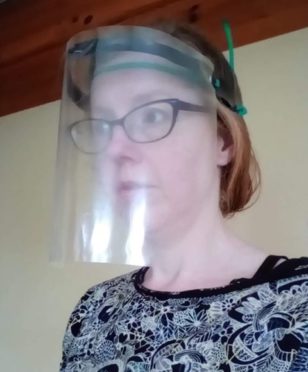A tiny Sutherland company has designed a face shield from recycled marine plastic, and made the plans available for all to use.
The shields are designed to complement standard PPE goggles and mask, which the company predicts they will be in increasingly short supply as the pandemic spreads across the globe.
Plastic@Bay, a community interest company based in Durness, was founded by geoscientists Julien Moreau and Joan D’Arcy to tackle marine plastic pollution in the north-west.
Mr Moreau said: “We have seen what is happening in other countries where there is a shortage of PPE, not a single country has avoided it.
“We have created some prototypes here, and we are ready to create up to 200 visors a day.
“The plastic comes from fish farm waste gathered from the beach and we make it with our plastic extrusion machine.
“The visors can also be made from sheets of A4 clear plastic, with simple attachments and elastic bands.
“We have put the plans online with instructions for everyone to be able to use.”
Plastic@Bay receives support from the Aviva community fund for its crowdfunding campaign to research and develop the making of construction material out of waste plastic, and Aviva has now allowed the campaign to change focus into visor-making.
Mr Moreau said that, in the best case scenario, the face shields won’t be needed here, but could be used in other countries.
He said: “In Thailand and Spain at the moment you can’t even get the materials to make a mould and produce them, because shipping has shut down.
“There is a shortage of transparent plastics in Wuhan, the manufacturing centre of the world, and they are experiencing problems getting everything back up and running.
“We have skills we can use here, and it’s better to be proactive instead of sitting around during lockdown.”
Mr Moreau said the visors will reduce the “virus charge”, the amount of water-borne droplets potentially carrying the virus that could settle on the skin.
He said: “They would be useful for emergency services and people like cashiers, who are having to wear masks, or work behind plastic sheets.”
He has sent samples to a number of Scottish hospitals, including Raigmore.
“It is better to produce the shields now instead of having a shortage,” he said.
In another recycling advantage, the boxes used to ship out supplies will double as a sterilisation box through being lined with recycled plastic.
Plastic@Bay’s design and instructions can be found on its website.
